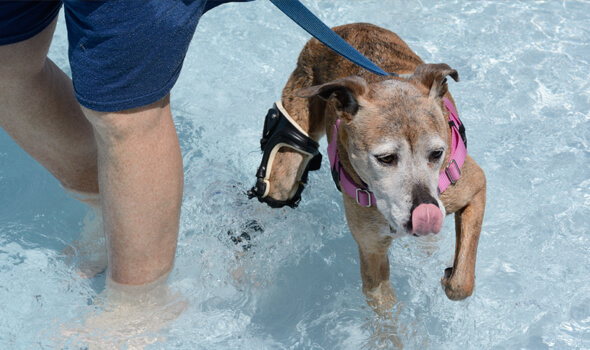
CCL Repair
A Joint Effort – CCL Repair Surgery at Bear Valley Veterinary Care Center
The cranial cruciate ligament (CCL) is a primary ligament in a pet’s knee. This ligament—similar to the anterior cruciate ligament, or ACL, in humans—helps hold the knee in its proper alignment. This ligament supports the knee by continuously bearing a pet’s body weight and preventing the femur from sliding against the tibia. This constant tension leaves the CCL highly vulnerable to injury, and a CCL tear is one of the most common orthopedic injuries in dogs, particularly in large breeds.
The CCL can rupture due to ligament degeneration or traumatic injury, and when this happens, the knee cannot bear any weight. Pets with torn CCLs have dramatically reduced mobility and experience pain and inflammation. Dogs are unable to put weight on the affected leg and will walk with a pronounced limp. Plus, when pets get used to favoring one leg over the other, they can often end up tearing multiple CCLs in different limbs. If CCL tears are left untreated, they can lead to osteoarthritis and further meniscus damage.
Bear Valley Veterinary Care Center offers several surgical options for treating CCL ruptures, including extracapsular repair and tibial-plateau-leveling osteotomy (TPLO). The procedure that is right for your pet will depend on the severity of the tear and many patient-specific medical factors, like your pet’s age and general health status.
All CCL repair procedures at Bear Valley are performed by highly trained veterinary surgeons. Specialists complete multi-year, advanced training to achieve board certification. Our skilled surgeons work closely with your pet’s primary Bear Valley veterinarian to ensure patient safety and excellent care quality.
CCL Repair Procedures Performed at Bear Valley Veterinary Care Center
Extracapsular Repair: The extracapsular repair procedure uses a robust suture material to replace the cranial cruciate ligament. As the pet heals for a few months after surgery, scar tissue develops along the suture, reinforcing the repair and stabilizing the knee. While it is not the sturdiest repair method available, the surgery is highly effective for smaller pets and pets that are less active. It also has the fewest possible complications compared to other CCL procedures.
Tibial-plateau-leveling osteotomy (TPLO): Tibial-plateau-leveling osteotomy (TPLO) is an advanced surgical procedure performed on dogs to repair a ruptured CCL. The procedure restructures the way the leg bones interact within the knee to restabilize the joint. This innovative surgery alters the slope of the tibia, allowing the femur to rest directly on the bone. This is done by making a circular cut in the upper section of the tibia and rotating the bone until the plateau is level. Upon achieving the desired angle, a steel plate is attached to the bone to hold it in place and allow for proper healing.
By leveling the tibial plateau, the femur is no longer able to slide against the bone and cause damage. After a TPLO procedure, a pet has a load-bearing, stable joint without the cranial cruciate ligament.
Recovering from CCL Repair Surgery
Both extracapsular repair and TPLO surgery are major surgical procedures that require an initial recovery period of 12 weeks. Your Bear Valley Veterinary Care Center veterinarian will likely prescribe pain medications, laser therapy, and antibiotics in the critical period following the procedure to manage discomfort and prevent infection of the surgical site. Pets must wear a collar to keep them from licking the incision for the first two weeks following surgery.
After a CCL operation, pet owners must severely limit their pet’s exercise for the first few weeks so the bone and soft tissues can heal. Pets should be confined to a small area in the home to restrict unnecessary movement and prevent strenuous activity. Regular veterinary checkups and X-rays with your Bear Valley veterinarian will monitor your pet’s recovery, assessing limb and joint function as well as general mobility. As your dog heals, we may recommend gradually increasing exercise based on individual evaluation.
We often recommend physical therapy after surgery to maximize recovery. Rehabilitation may include strength training, range of motion techniques, and aquatic therapy to help strengthen the joint and restore mobility.
If you suspect your pet has torn or ruptured their CCL, call us at (303) 985-3316 right away! We’ll schedule a consultation with one of our experts and work to get your pet back on four paws again.
Schedule an appointment at Bear Valley Veterinary Care Center as soon as you can if you suspect your pet has a torn CCL.